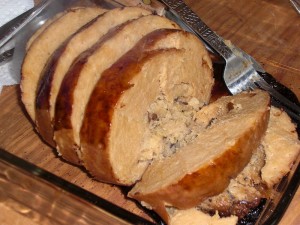 As this year’s Thanksgiving season rolls around, you or one of your parents might be thinking about the meat substitute known as tofurky, appealing to would-be vegetarians and people attempting to eat healthier by replacing the classic bird with something that has the taste of meat without the health effects. A couple of years ago, tofurkey first popped up on the news, a vegetarian turkey substitute made from tofu. Tofurkey also contains wheat and canola oil, among other ingredients.
As this year’s Thanksgiving season rolls around, you or one of your parents might be thinking about the meat substitute known as tofurky, appealing to would-be vegetarians and people attempting to eat healthier by replacing the classic bird with something that has the taste of meat without the health effects. A couple of years ago, tofurkey first popped up on the news, a vegetarian turkey substitute made from tofu. Tofurkey also contains wheat and canola oil, among other ingredients.
Now, to understand some of my thoughts on tofurky, let’s first take a look at what tofu is made of. To put it simply, tofu is made from soy milk, which, in turn, is made from soy beans – a staple crop native to East Asia. Wheat, of course, is also a staple crop, meaning the meat of the ‘meat’ is comprised of two staple crops.
Staple crops.
And yet there’s an entire industry, selling these amalgamations of wheat and tofu and other flavorings as a substitute for meat! Granted, the actual ingredient list for tofurky is a lot longer, but the idea of dressing up tofu and wheat, both from staple crops, in a bunch of flavorings and the like and calling it a meat substitute seems a dubious idea at best. It’s like taking bread or a tortilla, slathering A1 Steak Sauce on it, then claiming it’s a steak. In fact, it’s even worse, since instead of simply slathering Steak Sauce, it also adds a whole load of sodium and sugar from the preservatives and spices in the ‘meat’ — and who knows what else? That’s not even the worst thing about foods like tofurky and other processed foods — do we even know what’s in our food anymore? When it comes to things like tofurky, the answer is, barring the chemists and nutritionists, no.
I’m not going to claim that foods like these are bad because they’re “unnatural”. That topic’s just a can of worms, big enough to have a fallacy specifically calling it out, and I’m going to take a peek to show you why no-one, let alone I, can possibly claim that natural is better.
For starters, what is or isn’t natural can be quite ambiguous and confusing — the very fact that I’m ranting about the existence of products like this could qualify as “unnatural”, as could the medium through which I’m ranting, the medium through which you’re reading my rant, the medium through which I heard about my current topic, and everything human society has created — yet perhaps none of those would qualify. Most of the things us humans have were, at one point, thought to be unnatural, such as altruism, organization, and intelligence, yet research and study have shown that there are animals that possess such traits and behaviors — this all calls into question what being human really means. And if you think the government’s going to be of any help in pinning down the what the word “natural” means for food, you’re going to be sorely disappointed. The Code of Federal Regulations states that natural flavoring is “the essential oil, oleoresin, essence or extractive, protein hydrolysate, distillate, or any product of roasting, heating or enzymolysis, which contains the flavoring constituents derived from a spice, fruit or fruit juice, vegetable or vegetable juice, edible yeast, herb, bark, bud, root, leaf or similar plant material, meat, seafood, poultry, eggs, dairy products, or fermentation products thereof, whose significant function in food is flavoring rather than nutritional.” Hard to stomach, eh? You don’t even have to read the whole of the definition to see the possibilities for shenanigans like adding an ingredient that doesn’t sound like it belongs.
Worse yet, even the way the “flavor” is created or acquired can change its status of “natural” or “artificial”, but I’m not going to go into detail on the subtleties of that seemingly simple subject. The problem I have with today’s foods is that we barely understand what goes into them, and what effects it may have on us. The previous paragraph about the blurred definition of “natural” shows how little we know about today’s foods, and how we’re still struggling to understand the own products we manufacture and what effects they might have on us. Only the very simplest of processed foods, like bag of Lay’s Original Potato Chips, have easy-to-understand ingredients lists — potatoes, oil, salt — yet with something as innocent as a bag of tortilla chips, you get a laundry list of bizarrely-named products that look more like a chemistry cheat sheet than something you’d want to put in your mouth, let alone eat.
All in all, the concept that goes into tofurky and other processed may seem harmless on paper — a way to enjoy a certain food without the problems that particular food carries, but in practice, they have their own sets of problems, some of which we haven’t even discovered yet. This Thanksgiving, before you sink your teeth into the tofurky — or anything else, make sure to know what you’re eating. After all, you are what you eat, and you want to know what you are, right?













